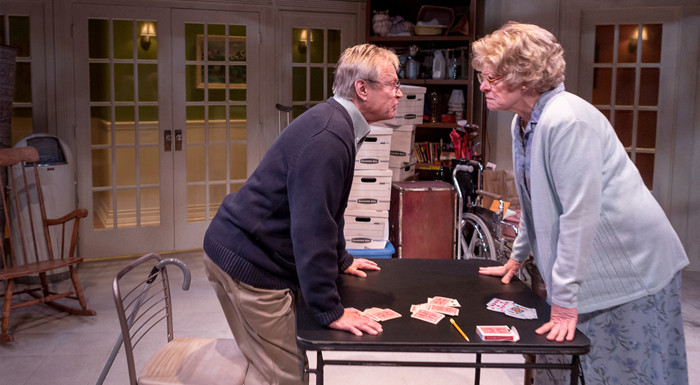Review: Artists Rep’s ‘The Gin Game’

Allen Nause and Vana O'Brien face off in Artists Rep's production of 'The Gin Game.'
Image: Owen Carey
I’ll be frank: watching Artists Rep’s production of The Gin Game is akin to watching geriatric card game rape. With every game that Fonsia wins (and rather exhaustingly she wins all but one), Weller gets angrier and more violent. With every outburst, Fonsia says no, she’ll play no more. But over and over again, Weller sweet talks or coerces her into one more hand, and in her loneliness, despair, and desperation, she assents. And we watch, complicit, as they needle and eventually torture each other in their game—with enough humor thrown in to keep us from calling the nurse.
I spent a good deal of the past year in a nursing home, watching my grandmother transition from her own condo to independent and then to assisted living. I sat with her at lunch while she chatted about achingly banal nonsense with the other single (widowed) nonagenarian ladies. The weather, the squirrels, the food. I wanted to run myself over with an electric wheelchair to at least incite a little sensation.
In the first act, Fonsia’s and Weller’s conversation took me back to those lunches (as well as to my grandparents’ kitchen table at the rare unarticulated times of discord). D.L. Coburn’s script is as much about what is unsaid as said, what is beyond communication as what is in reach, and it strikes a rarely struck, existential, and even poignant chord, which is likely why the play made his name in 1977, won a Pulitzer in 1978, and continues to be performed around the world.
The Gin Game
Artists Repertory Theatre
Mar 26–Apr 28
Under the direction of JoAnn Johnson on a cluttered, realist set by Jeff Seats, strong performances by Nause and O’Brien embody all the befuddled angst of that moment when you’re removed from the world you know and placed into the ersatz prison that is a nursing home. From his opening empty gaze and dangling cigar, Nause channels the cantankerous, existential defeat of his character with a repressed glee (although physically he seems a bit spry for a man requiring a nursing home). And O’Brien’s hands are archetypal old lady hands—too uncomfortable to rock any boats—which makes her final, can’t-repress-it-any-longer, foul-mouthed outburst one of the best moments of the play.
Yet writing about characters so loathe and unable to express themselves leaves a playwright in a bit of a bind, and it shows here in the first act, which is mostly cute and often funny geriatric patter that goes on too long without going anywhere too substantial. Only in the second act do we start to get a glimpse of the inflamed histories and complex, regretted choices that drive our pair. But after the roller coaster of so many ups and downs, the same cycle of outburst and return too many times over, we are a bit anesthetized by the time the final confrontation hits, leaving us to wonder if anything has changed at all, or if next week they’ll both be back in the same room, playing the same game, fighting the same fight. Then again, maybe that’s the point. But I couldn’t help but feel the ending should have just been the end of the first act, with another act still to come.




